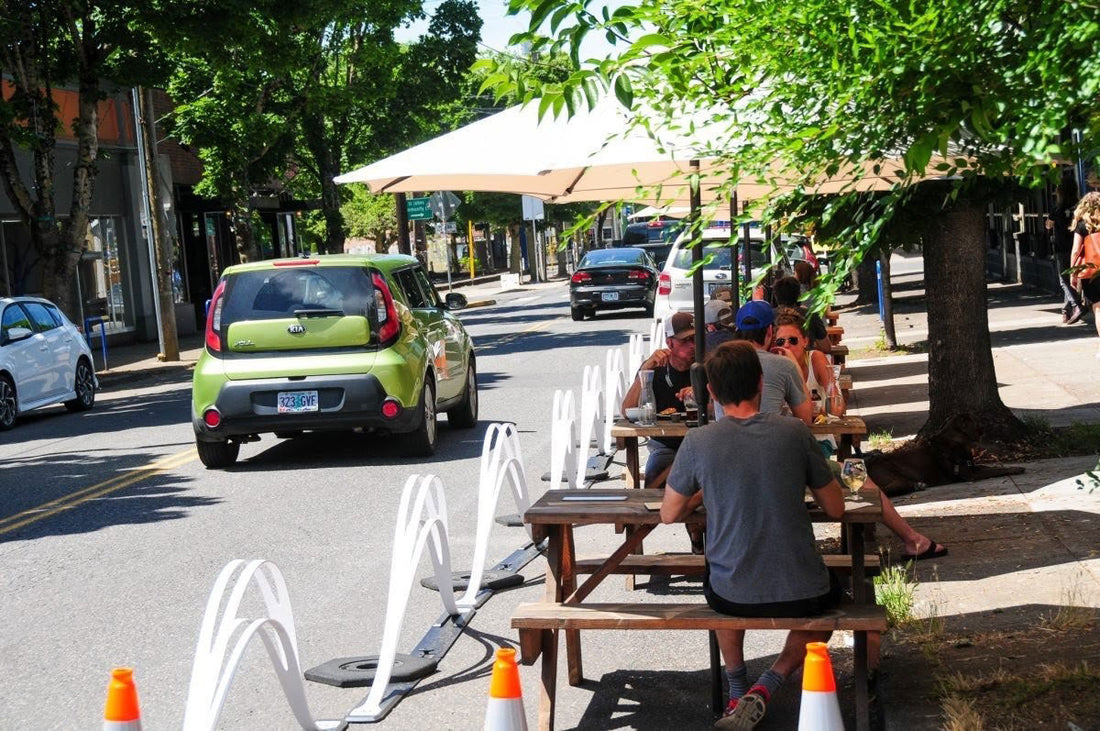By: Andy Lambert, Global Sales Manager
COVID-19 has been slowly suffocating restaurants, bars and cafes, especially those who were not able to quickly pivot to curbside pickup or delivery. Even where dine-in allowances have been made, the capacity and seating restrictions make it very difficult for these business owners to recoup a profit. While indoor capacity is limited, outdoor capacity is growing with the help of “streateries”.
A “streatery” can be defined as a pop-up patio or dining space utilizing the street where a car would normally have occupied the space. These may also be known as “parklets” and are common in a lot of European cities. In 2015, the Seattle Department of Transportation (SDOT) piloted this concept and it eventually became a permanent program. For a more comprehensive outline of this program, check out SDOT’s Streatery Supplement.

Credit: J. Maus/BikePortland
Due to many offices and other places where workers have switched to telecommuting during the pandemic, streets in cities all over the country are now abundant with available space. From Oakland to Minneapolis to New York City, this newly available public space is being reclaimed by pedestrians, rollers, cyclists and now, diners and curbside takeout.
According to the City of Minneapolis’s Public Works Department, they have issued permits for and installed more than 50 Pick-up only zones for businesses. The zones allow parking for up to 10 minutes for people picking up take-out food or other items.
The City of Portland and Portland Bureau of Transportation (PBOT) recently launched their Safe Streets Initiative in response to the COVID-19 public health crisis. Their website says, “Part of this initiative is a Business Toolkit, including permits, that allow temporary changes to streets to give people more space to conduct business safely.” Businesses can apply for permits to operate in the public right-of-way including portions of the sidewalk, parking lots, streets and alleys. Neighboring businesses are encouraged to work together to find a solution that works for them, whether it’s using the space immediately in front of their business, or getting all of the businesses on their block to agree to temporarily close the entire street to car traffic.

Credit: J. Maus/BikePortland
PBOT requires use of traffic control devices in some cases where portions of a street are permitted to be closed off. They provide a list of examples of traffic control solutions, including the Wave Delineator.
“In Portland, we’re supporting local businesses during the Covid-19 pandemic by offering free street space through our Healthy Businesses permit program. Businesses are able to operate safely and Portlanders are loving the experience of dining and shopping in the street. We’ve distributed over 600 permits so far and the applications continue to roll in,” said Amber Clayton, Right of Way Management and Permitting Division Manager at the Portland Bureau of Transportation. “Having traffic control devices that are attractive, welcoming, and easy to install has been incredibly useful for us. They are also a flexible solution, in that if our city’s re-opening plans change, we can re-direct their use for bike lanes, line queuing or food distribution, pop up pedestrian lanes, sidewalk expansion projects, or other non-construction traffic control uses.”

Credit: J. Maus/BikePortland
In Saris’ hometown of Madison, WI, the City announced its own Streatery program on May 28th. The program is temporary and will expire on October 25, 2020, or the date that Public Health Madison & Dane County allows restaurants to return to normal operations, whichever is sooner. In preparation for the July 4th holiday weekend, all six blocks of State Street (Madison’s primary dining and entertainment district) along with several other downtown streets and parking lots were closed over the weekend to vehicle traffic to make room for the Streatery Restaurant Recovery Program. This chunk of downtown streets will be closed every weekend through August 23rd. Restaurant owners can extend their outdoor seating areas onto public sidewalks and streets, giving them the chance to serve more people while still following physical distancing guidelines. The benefit of this program extends to other types of businesses as well. Local shops can roll out racks of clothes or tables of merchandise without paying an additional vending fee.
Given that we are still many months away from a vaccine or proven treatment method for COVID-19, could this idea of Streateries be another catalyst for permanently reclaiming public space for people instead of cars?
